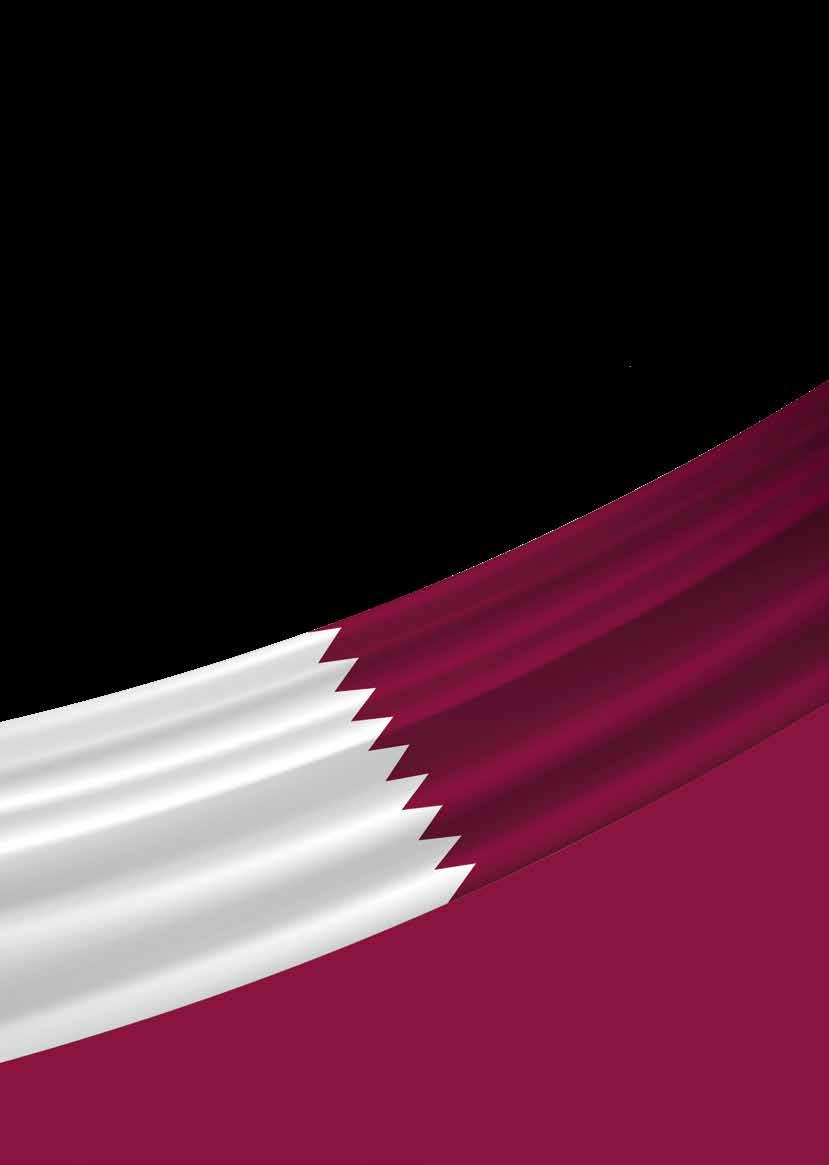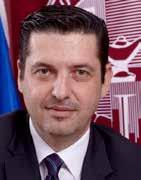Qatar at a glance
The State of Qatar is an Arab country in the Middle East, occupying a peninsula that juts into the Arabian Gulf. Since its independence in 1971, the country has emerged as one of the global producers of oil and gas. While there is increasing investment in non-energy sectors, oil, and gas still account for more than half of the Gross Domestic Product. Due to its substantial reserves of natural gas, the country has one of the highest incomes per capita in the world.

12 The source of this material is Qatar Chamber

13
Qatar economy remains resilient and attractive
Qatar continues to be a resilient and diverse economy despite the global impact of the pandemic.
According to the latest estimates of the World Bank the Qatari economy is expected to grow by about 4.9% in 2022 these indicators represent a fraction of the positive factors that have been achieved especially alongside the development witnessed by the current FIFA World Cup Qatar 2022 projects.
Qatar held impressive positions in the World Competitiveness Yearbook 2022 issued by the International Institute for Management Development in Switzerland ranking ninth globally in economic performance and seventh globally in government efficiency.
On the other hand, the International Monetary Fund confirmed the success of the development policies adopted by the state expecting the growth
of the nation’s non-oil sector to rise by about 4.1% compared to the oil and gas sector which is expected to grow by about 2.3% this year.
Qatar’s economy is expected to witness growth this year and is forecast to be the fastest growing in the GCC in 2023 and 2024.

The stable and resilient economy of Qatar has been growing at a fast rate. The country’s high per capita income, vast hydrocarbon reserves, and strong economic fundamentals support its strong credit profile.
FIFA World Cup Qatar 2022 to enhance Qatari economy
The FIFA World Cup Qatar 2022 will undoubtedly have a direct impact on the economic performance of Qatar in the medium and long term, in light of the good performance expected of the Qatari economy by many research centres and international institutions, despite the successive crises the world is currently going through, the
14
resulting slowdown in economic growth and the unprecedented rise in inflation rates.
According to recently announced official statistics, the direct financial revenues from organising the FIFA World Cup Qatar 2022 are estimated at QR8bn ($2.2bn), while the long-term economic revenues, from 2022 to 2035 are estimated at QR9.9bn ($2.7bn), amid expectations of high tourism revenues, which are expected to flourish during the World Cup and beyond.
The World Cup is a suitable opportunity to achieve the goals of Qatar National Vision 2030. More than $200bn has been spent on basic facilities such as roads, bridges, ports, airport, metro, housing, tourism and free zones, and this infrastructure will turn into gains after the tournament.
The World Cup will be a strong point to attract foreign investment and will reflect positively on the country’s future as an investment and tourism destination. The results from this hosting do not depend on the sports aspects only, but there are other aspects that are no less important, especially the economic aspects. The event will draw the world’s attention to the State of Qatar, and this will provide the opportunity for investors and businessmen from different countries of the world to know Qatar and its economy, and to discover the investment climate and the available opportunities. This will enhance the Qatari economy and contribute to attracting more foreign investments to the country, in addition it will enhance the status of the country as a leading global centre for business and investment. Beyond the World Cup, many sectors will be developed, such as tourism, knowledge economy, agriculture, industry, and other important sectors. The country’s expansion in LNG production coincides with an expected growth of the
economy in all sectors, especially vital sectors such as education, health care, construction, food security, technology and others.
Qatar set to record fastest GDP growth in seven years in 2022
Qatar is set to record its fastest GDP growth in seven years in 2022, Focus Economics said and


noted the gross domestic product will touch $216bn this year.
The researcher has forecast that Qatar’s GDP per capita will be $80,956 this year.
Elevated energy prices reduced impact of the pandemic, improved relations with Arab neighbours and the FIFA World Cup in November-December will be key drivers of Qatar’s GDP, Focus Economics
15
said. Growth will likely ease in 2023 amid rising interest rates, lower energy prices and faltering external demand.
Focus Economics researchers’ see a 4.5% rise in Qatar’s GDP during 2022, which is unchanged from last month’s forecast, and 2.7% growth in 2023.
GDP growth over the next four years has been forecast at 2.7% (2023), 2.9% (2024), 3.6% (2025) and 4.3% (2026).
Qatar’s GDP per capita has been forecast at $81,751 in 2023, $85,472 (2024), $91,609 (2025) and $97,833 (2026).
The country’s fiscal balance (as a percentage of the GDP) has been forecast at 9.2 this year, 5.8 (2023), 3.5 (2024), 4.0 (2025) and 4.5 (2026)
Qatar approves $56.13 bn budget for 2022
Qatar’s budget for 2022 has estimated expenditure at QR204.3bn ($65.13bn) , while total revenue will be QR196bn, up 22.4% on 2021.
The expected deficit has been estimated at QR8.3bn.

The general budget for 2022 was based on an average oil price of $55 a barrel due to the remarkable recovery in global energy prices, which still reflects the continued adoption of conservative estimates of revenues to maintain fiscal balance and limit the effects of oil price fluctuations on the performance of public finances.
Qatar’s budget for 2022 places adequate focus on three key sectors – infrastructure, education, and health, which will see the development and expansion of civic amenities, educational institutions, hospitals and other healthcare facilities.
QR74bn has been allocated for major projects out of the total expenditures of the general budget for 2022, as the state continues to complete public projects in accordance with pre-prepared plans and strategies.
16
Infrastructure projects, the development of citizens’ lands, and public services development projects, including health and education, are given spending priority.
Nearly QR38bn (18.5% of the total budget) has been earmarked for these two sectors with health getting QR20bn and education QR17.8bn.
QNV 2030 attaches great importance to economic diversification
The Qatar National Vision 2030 is the comprehensive development vision of the State of Qatar that has been adopted pursuant to the Amiri decision No. 44 of 2008, for the comprehensive development is the fundamental objective for the achievement of progress and prosperity for the citizens. as Qatar vision 2030 aims at transforming Qatar into advanced society capable of achieving sustainable development and securing a high standard of living for its people for generations to come.
It has been launched to serve as a clear roadmap for Qatar’s future.

It aims to propel Qatar forward by balancing the accomplishments that achieve economic growth with the human and natural resources. This vision constitutes a beacon that guides economic, social, human, and environmental development of the country in the coming decades, so that it is inclusive and helpful for the citizens and residents of Qatar in various aspects of their lives.
Economic development is an essential part of the Qatar National Vision 2030, as the engine that drives progress by providing better opportunities and a better way of life for the country’s citizens. Achieving that objective hinges on Qatar’s ability to create a balance between an oil-based and a knowledge-based economy, helping diversify the country’s economy and guaranteeing a stable and sustainable business environment. The Qatar National Vision 2030 will also guide the wise management of the Qatari economy, helping increase competition, attracting more investments, and stimulating growth.
17
QNV aims at diversification of the economy to transform it from an oil-based economy into a knowledge-based economy to achieve social and human development. To realize that vision, Qatar was keen to enhance its economic relations with other countries in all fields.
Sound Economic Management
• Reasonable and sustained rates of economic growth that secure a high standard of living for this generation and for future generations.
• Financial and economic stability characterized by low inflation rates, sound financial policy and a secure and efficient financial system.
• A stimulating business climate capable of attracting foreign funds and technologies and of encouraging national investments.

• Open and flexible economic structures capable of competing in a changing world.
• Coordination with Gulf Cooperation Council
states and with Arab and regional economic organizations to establish trade, investment and financial ties.
Suitable Economic Diversification
• A diversified economy that gradually reduces its dependence on hydrocarbon industries, enhances the role of the private sector and maintains its competitiveness through:
• Expansion of industries and services with competitive advantages derived from hydrocarbon industries.
• Design and development of economic activities in which Qatar can specialize, including the technical and human requirements of these activities.
• A knowledge-based economy characterized by innovation; entrepreneurship; excellence in education; a world-class infrastructural backbone; the efficient delivery of public services; and transparent and accountable government.
18
Qatar, where investment makes sense
With its political and economic stability, worldclass infrastructure, and access to growing markets, Qatar has become a magnet for foreign direct investment.
Qatar will be in the spotlight of the world’s media when the 2022 FIFA World Cup opens in Doha in November. Thanks to its unique position in the world’s energy markets and its recent strategic efforts to create a business and investment-friendly environment, the state is already accustomed to attracting attention.

The World Bank has forecast the Qatari economy to grow by 4.8 per cent this year, bolstered in part by its hosting of the FIFA World Cup. And, in November 2021, S&P Global Ratings affirmed Qatar’s long- and short-term foreign and local currency sovereign credit ratings at AA-/A-1+, with a stable outlook.
According to the World Economic Forum’s Global
Competitive Index, Qatar already possesses the second most competitive economy in the Arab world, while the US-based Global Entrepreneurship and Development Institute ranks its economy as the Arab world’s most entrepreneurial. In 2020, Qatar was ranked third in the World Bank’s Doing Business report for impact of tax on business. There is no doubt that the FIFA World Cup Qatar 2022 enhances the country΄s position as a leading global destination for business and investment, in light of the attractive legislative, regulatory, and institutional environment and advanced infrastructure.
Qatar’s economy will continue its growth and development after the country hosts the tournament, especially after the great leaps it has achieved over the past years, in light of the presence of attractions that enhance its growth process and increase global confidence. To attract investments, Qatar has manged to build a world-class infrastructure, and develop a pro-
19
investment and business environments, in addition to issue a host of legislation and laws that enhances the state’s position in the global investment map. The State also launched a host of strategies over the past years for the purpose of providing more incentives and facilities to local and foreign investors and paving the way for the private sector to expand its activities and maximize its share in the GDP to expand sources of income away from oil and gas. Qatar is open for investments of all its kinds and sector.
It offers a host of incentives for all investors, whether they are Qataris or non-Qataris, including the allocation of lands at nominal prices, the provision of electricity, water, and gas consumption at nominal prices, no taxes on exports, no quantitative quotas on imports and no income taxes

Incentives also include no taxes on Qatari companies or GCC companies that own businesses or share profits, the presence of efficient and
high-quality logistics services and the provision of appropriate infrastructures, as well as the legal and legislative environment that stimulate investments, the provision of safe supply chains and easy access to global markets through air and sea transport networks. Ease of obtaining residence permits for the investor and his family, flexibility in entry and residence laws for skilled and unskilled workers, and the provision of support and finance for SMEs are among the incentives.
Incentives also included the possibility for the foreign investors to own properties in three enterprises: The Pearl, West Bay Lake, and Al Khor Resort Enterprise, in addition to other 10 areas, in addition to the distinct location of Qatar, a center for air transport and a center for maritime transport, and the State’s high rankings in most global indicators, especially in the ease of doing business index. Furthermore, there are many incentives and facilities
20
provided by the Qatar Free Zones Authority (QFZA) and the Qatar Financial Center (QFC) to attract foreign investments and companies.
Foreign investment in Qatar, a wellorganised field in a fast-growing economy
As Qatar is preparing to host one of the biggest events internationally- world cup 2022- and in accordance with Qatar vision 2030, enhancing foreign investment in the country is considered of high importance to the state, consequently, a set of modern legislations have been issued and enacted since 2019.

On 7 January 2019, HH the Amir Sheikh Tamim bin Hamad al Thani, has issued Law No 1 of 2019 regulating the Investment of Non-Qatari Capital in the Country’s Economic Activity.
The New Law provides for up to 100% foreign ownership in all economic sectors, subject
to special legislation governing commercial operations conducted by non-Qataris and as defined by the New Law’s executive rules. However, banking, insurance and commercial agencies are not included in this allowance. In addition, foreign ownership in listed companies on the Qatar Exchange has been increased to a maximum of 49%, subject to the approval of the Ministry of Commerce and Industry.
The Ministry of Commerce and Industry (MoCI) highlighted the main provisions of the law, which aims at promoting economic development, attracting foreign investment in all economic and commercial activities, attracting 100 percent of foreign capital inflows, accomplishing economic diversification in line with the Qatar National Vision 2030, facilitating foreign investors’ access to the market and bolstering the country’s confidence and investment security index.
The law also outlines regulations governing the investment of non-Qatari capital, which is
21
permitted in all sectors of the economy across the country.
A non-Qatari investor is prohibited from investing in the banking industry and insurance companies except for companies excluded based on a decision of the Council of Ministers. Non-Qatari investors are also prohibited from investing in commercial agencies and may be prohibited from investing in any other sector as decided by the Council of Ministers.
Incentives for investment
• The law provided several investment incentives for non-Qatari investors, including the allocation of land to a non-Qatari investor to establish his investment project through rent or usufruct in accordance with the legislation in force in this regard.
• Under the new law, a non-Qatari investor may import necessary equipment to establish, operate and expand his investment project in accordance with legislations in force in this regard.
• Non-Qatari investment projects may be exempted from income tax in accordance with the procedures and regulations stipulated in the Income Tax Law.
• Non-Qatari investment projects shall be exempted from customs duties on imports of machinery and equipment necessary for their establishment.
• Non-Qatari investment projects in the industrial sector shall be exempted from customs duties on their imports of raw materials and semi manufactured goods that are required for production but are unavailable in local markets.
• The Council of Ministers may, on the proposal of the Minister, grant investment project incentives and benefits in addition to the incentives provided for in this law.
• Non-Qatari investments shall not be directly or indirectly, subject to expropriation or other similar actions, unless such actions are undertaken for the public good and in a non-discriminatory manner in exchange for a fair and appropriate compensation in accordance with the same procedures that apply to Qataris.
• A non-Qatari investor is free to transfer his investments from and to Qatar without delay.
These transfers include the proceeds from the sale or liquidation of all or some of his investments, the proceeds of the settlement of investment disputes, and any compensation due to a nonQatari investor.
• The foreign investor may transfer the ownership of his investment to any other investor or relinquish it in favour of his national partner in case of a joint venture in accordance with legislations in force.
• The Investment shall continue to be treated in accordance with the provisions of the law provided that the new investor continues to operate the project and assumes the previous investor’s rights and obligations.
• With the exception of labour disputes, a nonQatari investor may also agree on settling disputes with third parties through arbitration or any other means of dispute settlement.
• The Ministry noted that Article 25 of Law No. (1) of 2019 on regulating the Investment of nonQatari capital in economic activity states that the provisions of this law do not apply to companies and individuals that the State tasks with the extraction, exploitation, or management of natural resources through a concession or special agreement, except to the extent where it is not contrary to the provisions of the concession or special agreement.
• The provisions of the law shall not apply to companies that the government establishes or in which the government and other public institutions and companies contribute at least 51 percent of the capital or less, in partnership with non-Qatari investors provided that the Council of Ministers agrees, in accordance with the provisions of the Commercial Companies Law.
• The provisions of the law shall also not apply to companies and individuals licensed by Qatar Petroleum to carry out petroleum operations or to invest in the oil and gas sector or petrochemical industries.
Labour Reforms
Over the past few years, the State of Qatar has implemented a number of extensive reforms to strengthen labour laws and ensure a decent life
22
for expatriate workers, safeguard their rights, and secure their safety, as well as create a system that is fit for purpose for both employees and employers.
In 2017, Qatar and the International Labour Organization (ILO) along with workers’ and employers’ organizations agreed to collaborate to support Qatar’s ambitious reform agenda. Since then, the state has made significant progress in the labour market and has received international acclaim from major human rights groups and UN organizations. These reforms elevated Qatar to a leading position in the GCC region in this regard.
To support labour market, Qatar adopted several leading steps and issued a series of legislation and laws that have contributed to creating a balanced working environment.

The reforms included the cancellation of exit permit for expatriates when leaving the country, allowing
workers to change jobs freely without the need for employer’s consent, the establishment of minimum wages and the introduction of the Wage Protection System (WPS), as well as the inauguration of visa centres abroad and the establishment of labour dispute resolution committees. Other reforms included the development of complaint system for migrant workers to facilitate achieving justice in the country.
Furthermore, the government also adopted positive steps for improving workers’ occupational safety and health and issued a law mandating health insurance for all expatriates. Beyond any doubt, these reforms enhanced Qatar’s global reputation and have been recognised by major international labour organisations and institutions.
23
The Qatar Chamber of Commerce and Industry (QCCI)

The Qatar Chamber of Commerce and Industry (QCCI) is the primary representative of the Qatari private sector.


Its principal activities include representing the general interest of the business community, providing information and advice to members, promoting economic development, providing market information and economic statistics, encouraging foreign investment, and facilitating international trade.
Established in 1963 by virtue of the Law No (4), Qatar Chamber of Commerce & Industry (QCCI) is one of the oldest chambers in the GCC countries. Its main role is to organise business interests and represent the Qatari private sector locally and globally as well as support the country’s economic actors and productivity.
On 29th Nov 2017, His Highness the Emir Sheikh Tamim bin Hamad Al-Thani issued law No. 23 of 2017 which amended some provisions of the Law No. 11 of 1990 on the establishment of the Qatar Chamber of Commerce and Industry.
The Qatar Chamber plays a key role in enhancing cooperation between Qatari private sector companies with their counterparts from other countries from around the world. It also helps companies connect with government entities, as well as acts as a bridge for Qatar-based firms seeking to cooperate with local and international firms.
Its vision revolves around achieving international leadership among the world chambers of commerce in the frame of the Qatar National Vision 2030 and to be the focal point for all world institutions and bodies for any information and data about Qatar's business community and about doing business in one of the most dynamic economies in the world. The Chamber aims to regulate, represent, defend, and
promote the commercial, industrial, and agricultural interests in Qatar and support the national economy and productivity for the advantage of the country in general and the interests of its member companies. It also strives to support and develop a sustainable business environment for local and foreign businesses, as well as develop an international trade system and enhance its cooperation relations with other chambers around the world. Furthermore, it seeks to enhance Qatar’s economy diversification strategy and attract foreign
24
investments and exert all possible efforts to enhance Qatar’s position as an international business centre and an attractive investment destination.
Qatar Chamber in 2021
Last year, the Qatar Chamber continued its efforts to support and develop the business sector in the country and to encourage investment and facilitate its growth.


It continued to provide its services to the Qatari business community during the COVID-19 pandemic and participated in the governmental efforts made by
conditions, as well as the obstacles facing sectors and suggestions for solution.
In 2021, the Chamber signed an agreement for purchasing a new building for its headquarters in the Commercial Boulevard in Lusail City.
The Chamber has organised more than 145 events, whether in person or virtually. It hosted many business delegations, participated trade fairs, and organised several seminars and forums, in addition to external visits, trainings and arbitration activities and publications.
It also hosted a number of seminars and meetings with concerned bodies to discuss issues and matters related to the private sector.
It participated in about 20 events that were held outside the country, whether in person or via video conferencing.
Qatar and Greece… Close Relations & Promising Future
The State of Qatar and the Hellenic Republic enjoy close and distinguished relations in all fields, especially in the economic and commercial aspects. Both countries are keen to enhance their economic and trade ties at all levels.
Relations between both countries are witnessing a remarkable development in light of the efforts of the two countries to strengthen them in various fields and in line with the interests of the two friendly countries. This is evidenced by meetings between officials in both countries and the exchange of high-level official visits, in addition to the number of agreements and MOUs signed between them in various fields.
Joint effort is also being made in other fields with a view to broadening the scope of bilateral cooperation through the exploration of possibilities for the two countries to fully exploit the existing potential, which is abundant on both sides.
the State to limit its spread and contributed to helping the private sector play its role during the crisis.
It completed more than 56 thousand electronic transactions and issued about 42 thousand certificates of origin for exports and 5 ATA Carnets, while the total number of members grew to 70,000.
The Chamber’s sectorial committees held many meetings with representatives of companies in which they shared their feedback and views on each sector
Last year, the two countries’ bilateral trade amounted to QR897mn compared with QR409mn in 2020, showing a growth of 120 percent.
As for the mutual investments, there are about 41 Greek companies operating in Qatar with local partners and 6 Greek companies with full ownership.
Greek companies in Qatar are active in various fields such as trading, contracting, communication, consultancy, painting manufacturing, real estate, and others.
25





























